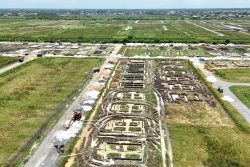In an August 11th letter brimful of nostalgia and social history, Claudius Prince outlined elements of the self-help housing scheme which had been pioneered under the Forbes Burnham administration in the 1970s and 80s and which resulted in several well-developed settlements.
He wrote that the programme saw low-income workers banding themselves into groups. Each week or monthly, members would lodge whatever they could afford into a common pot. After a year or so groups were able to raise the monies that the Ministry of Housing requested for the clearing of land on which the groups would start building their homes. Material was provided by the Ministry, and building commenced under the supervision and guidance of an experienced ‘foreman’ employed by the said Ministry.
When material was sent to the building site, members of the group paid keen interest and would reject material they considered substandard. Further, to ensure that all the houses were given equal attention by group members, no one knew which house would be theirs before all the houses were completed. Then, the houses would be numbered and each member of the group was asked to draw a number which would indicate the house allotted to them. He wrote that involving citizens in the building of their own home gave home owners a sense of self pride that could not be equalled. He further pointed out that the vast majority of persons obtaining homes by way of the Burnham self-help programme were single mothers, office cleaners, labourers and office assistants. This is the same underprivileged group that this government has said that it is also targeting.
Mr Prince noted that there were other spinoff benefits. With self-help groups when a specific group’s turn came around to be allotted land and the assigned land was not satisfactory to the group, the group could yield its position to the group next in line and assume the position of that group on the waiting list. Further, after the drawing of lots and being assigned a house, members were free to swap houses.
“Many did so because there were persons they preferred to have as immediate neighbour or because of their preference for a particular spot”, he wrote.
Further, self-help allowed participants to learn a trade, so when later on homes were in need of small repairs home owners would not be saddled with the high cost of employing a skilled carpenter or mason since they could do these things themselves. Being exposed to the various skills required for building a house also offered many self-help group members an opportunity to pursue new forms of employment.
“Thus, by way of self-help, housing schemes such as Festival City, Stevedore Housing Scheme, Meadow Brook Housing Scheme, Upper North Ruimveldt Housing Scheme etc were born. Thus, allowing office cleaners, office assistants etc to be able to own their own homes, at a cheap cost since there was no labour cost and they did not have to risk being ripped off by sawmills and unscrupulous contractors”, Mr Prince wrote.
What he related sounded eminently sensible and immediately obviated the need for mortgage financing notwithstanding the current decline in rates that the government has quite commendably been able to inspire.
President Ali has had experience with the housing programme in his previous role in government and his current ministers Collin Croal and Susan Rodrigues are heavily involved. All types of solutions are under consideration, including as pointed out by Mr Prince, the homesteading proposal for single mothers which was enunciated at the recent building expo.
It would be well worth the time of the housing ministers to discuss whether at all there is any applicability of self-help to programmes currently under consideration. This is beyond the building materials assistance that the government is providing to some communities. Self-help clearly has its virtues in the inculcation of a sense of real ownership and actual labour – even if just painting – a sense of community and easier way of financing.
Was this form of housing development ever on the radar of Mr Croal and Ms Rodrigues? Was it possibly the case that it was spurned on the grounds of its association with Mr Burnham?
In concluding his letter Mr Prince was not sanguine about this government associating with anything at all under the Burnham administration no matter how beneficial it could be.
“ It would seem to me that any fair-minded examination of these recent approaches at housing the poor would have to conclude that the Burnham self-help programme seems to reflect more thought than all of the programmes undertaken or being contemplated by the present government. Therefore one would think a caring government would embrace at least some of the features of Burnham’s self-help programme as they seek ways of making housing cheap for low income citizens.
“However, we all know the PPP/C government would never contemplate doing such a thing. You see, the self-help approach to housing the poor was a programme conceived by President Burnham and hatred for Burnham give rise to those in the PPP a need to discredit everything he did, even if it means denying the poor some relief”.
The government should make a good faith effort to disprove either the effectiveness of this programme or Mr Prince’s pessimism that it would be ruled out simply because of its provenance.
The perfect way to do this would be for housing officers to select one of these communities and to do an intensive house-to-house survey. Are the current householders the original owners? How would they or the current occupiers characterize the quality of the work done? Have the houses been added to? Has the supporting infrastructure such as roads and drains held up? How many of the original self-helpers are still in the community? Were they able to get market rates or higher for their homes? Would they do it again? This is the type of proofing that is required for programmes encompassing public expenditure and given the points raised by Mr Prince it is well worth pursuing.




